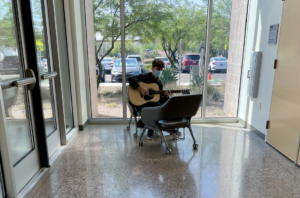DLN Report Card: Expanding Online Course Access in Texas

Last month, ExcelinEd’s Digital Learning Now initiative released the 2014 Digital Learning Report Card.
Each week, we are sharing a state story from the Report Card from the EdFly Blog. These posts highlight progress and share success stories from individual states across the nation. Stories are based on interviews with policymakers and stakeholders and are published in collaboration with Digital Learning Now.
Today, we look at Texas.
Course Access is on the rise in the Lone Star State.
In 2013, Texas lawmakers passed HB 1926 to improve the state’s online Course Access program by expanding access to high-quality options through increased online courses, special attention to professional development, enhancement of courses and changes to the approval and review process. The law has been able to accomplish all this by tapping into the existing Texas Virtual School Network (TxVSN).
Through the Texas Education Agency (TEA), TxVSN catalog courses are now open to any student working towards their graduation requirements – allowing students in grades 6-12 to take up to three courses online annually. Because administrative rules allow students to enroll in high school courses before ninth grade, middle school students are able to enroll in TxVSN courses as well. This means, for example, that an advanced middle school student could access an upper level virtual math course not offered at his or her school.
Quality over Quantity. To expand provider eligibility, increase flexibility and maintain a focus on standards, HB 1926 modified the course review process and allowed for private and nonprofit providers to apply for inclusion into the state catalog.
Courses must meet the Texas Essential Knowledge and Skills standards and are rigorously reviewed by TxVSN Central Operations. During the process, two independent reviewers assess the course’s alignment with Texas standards and iNACOL National Standards for Quality Online Courses.
Barbara Smith, Project Director at TxVSN Central Operations says, “With this process, reviewers look at a variety of indicators, including accessibility, state curriculum and national standards. Nobody wants to hear their course isn’t perfect, but some aren’t initially accepted. In the end, our providers are happy because we have raised consciousness of what a great course is.”
Program Requirements. Students can take up to three courses annually at no cost to their family, and key components of the program include:
- HB 1926 requires districts to send copies of their local policy to students eligible to participate in the Course Access program to ensure students and families are aware of the options available to them.
- The law caps the cost of each course in the program at $400 per semester
- Seventy percent of the course cost is paid up front. The remaining 30 percent is paid only when students successfully complete a course. This helps ensure providers have an incentive to make sure students succeed.
Challenges to Face. While there are now increased opportunities for students and providers, there are concerns that the $400 per course limit could discourage some high-quality providers from listing courses in the catalog. Some states are using different funding mechanisms to drive quality and accountability, while ensuring the course offerings market is open to many providers. Louisiana, for example, allows for a unique market framework, which creates a range of pricing options.
Texas schools are also allowed to prohibit students from enrolling in TxVSN courses if they offer a “substantially similar course,” which would limit students’ ability to use the Course Access program. Texas is working to create clarity around some of the subjective criteria, and the state is currently considering legislation that would address some of the program’s challenges.
Previously published stories include Arizona, Florida, Louisiana, Michigan, Ohio, Utah and West Virginia. Stay tuned for more stories of states advancing personalized digital learning.
Erin Lockett is a Policy Coordinator at The Foundation For Excellence in Education.






0 Comments
Leave a Comment
Your email address will not be published. All fields are required.